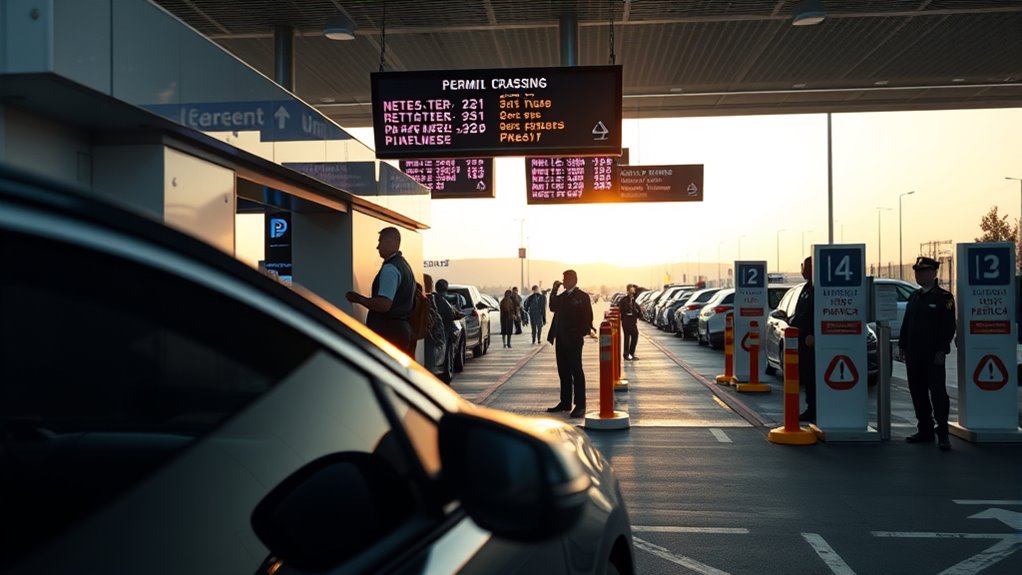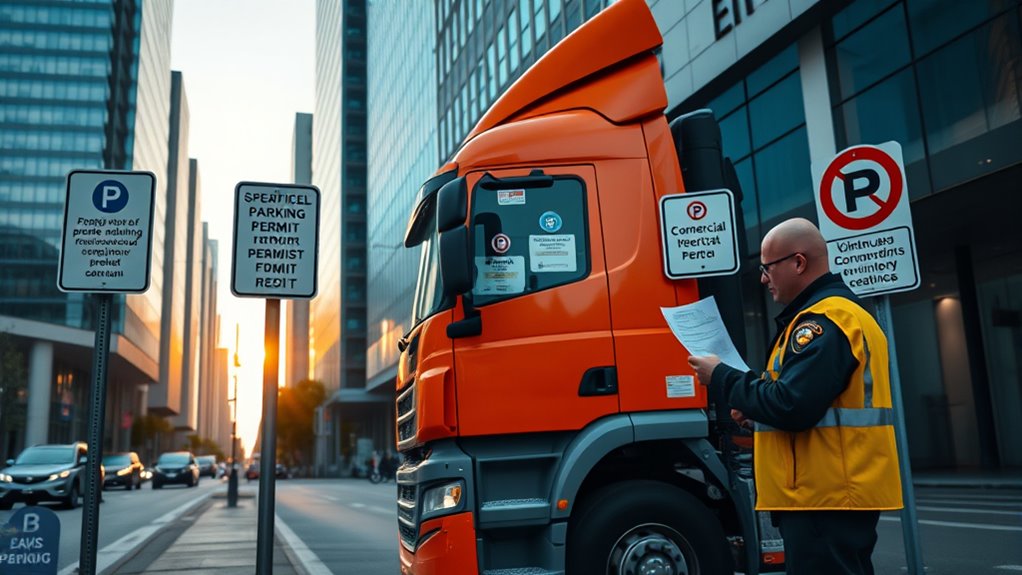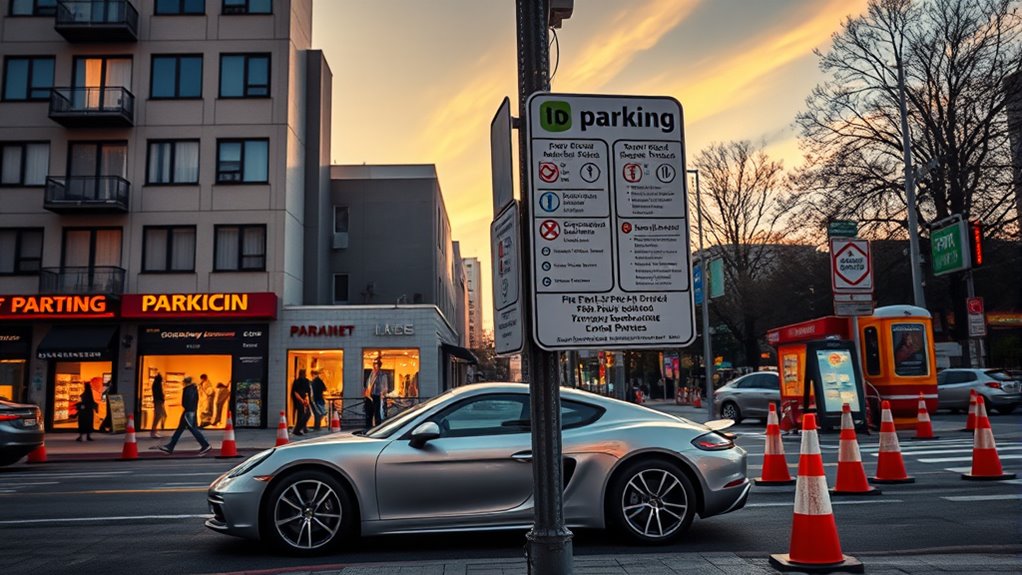To navigate travel permits and parking regulations, start by understanding the different permit types and their specific requirements, then obtain or renew them through official channels. Pay attention to signage, pavement markings, and designated zones to avoid fines, and always display permits correctly. For commercial or international travel, follow special permit rules and document checks. Staying informed through apps, official websites, and alerts helps you comply easily—continue for detailed tips to stay compliant and hassle-free.
Key Takeaways
- Understand permit types, requirements, and renewal processes to ensure compliance across different regions and travel purposes.
- Recognize parking signage, markings, and restrictions to avoid fines and towing violations.
- Use mobile apps and official resources for real-time parking info and updates on regulations.
- Display valid permits clearly in designated zones and adhere to time and zone restrictions.
- Stay informed about local laws, permit conditions, and enforcement practices through official channels and community updates.
Understanding Different Types of Travel Permits

Have you ever wondered what types of travel permits are required for different journeys? Knowing permit types is essential to avoid fines and delays. There are various permits depending on your destination and purpose, such as transit permits, special access passes, or regional permits. Each permit type has specific conditions, including parking restrictions that you must follow. For example, some permits allow parking in designated zones, while others restrict parking altogether. Understanding these distinctions helps you plan your trip effectively and stay compliant with local regulations. Always check the permit requirements beforehand, so you’re aware of any parking restrictions that could impact your travel. Being informed about permit types ensures a smoother journey and helps you avoid unnecessary penalties. Additionally, parking regulations can vary widely depending on the permit issued and the jurisdiction, making it crucial to understand the specific rules associated with your permit.
How to Obtain Necessary Travel Permits

To obtain the necessary travel permits, start by identifying the specific permits required for your destination and purpose, as requirements can vary widely. Once you know what you need, submit a permit application through the appropriate authorities, whether online or in person. Keep track of renewal deadlines to avoid delays. If your permit expires before your trip, you’ll need to complete a permit renewal to stay compliant. Some permits require additional documentation, so prepare those in advance. Here’s a quick guide:
| Permit Type | Renewal Process |
|---|---|
| International | Submit renewal 30 days before expiry |
| Commercial | Permit renewal required annually |
| Special Access | Renewal varies by jurisdiction |
| Vehicle Permits | Renew before permit expiration |
| Event Permits | Apply for renewal if extending dates |
Additionally, understanding the importance of permits and regulations can help ensure a smooth travel experience, especially since micro-mobility devices often have specific local requirements that differ from traditional vehicles. Recognizing how consistent storytelling in your planning and documentation can also help prevent misunderstandings with authorities and streamline the permit process. Being aware of local guidelines related to parking regulations can further help avoid fines and ensure proper compliance during your travels. Incorporating knowledge of jet boat capabilities and restrictions can also be beneficial if your trip involves water navigation, ensuring safety and adherence to local rules.
Common Parking Regulations and Restrictions

Understanding parking regulations is key to avoiding fines and ensuring smooth travel. Many areas enforce strict parking rules through parking enforcement, making it essential to know the common restrictions. Typically, parking is limited to designated times or zones, and overstaying can lead to tickets or towing. Some locations offer permit exemptions for certain vehicles, like disabled or government-issued permits, but these do not automatically grant access everywhere. Be aware of posted signs and local ordinances, as rules vary widely between districts. Always check if special permits are required or if exemptions apply to your situation. Staying informed about these regulations helps you avoid penalties and makes parking more convenient during your travels. Knowing parking permit regulations can further help in avoiding violations and ensuring legal compliance. Additionally, understanding the types of parking available can assist in selecting the most appropriate spot for your needs. Being familiar with parking enforcement practices in your area can also prevent unexpected fines.
Recognizing Signage and Markings in Parking Areas

Recognizing signage and markings in parking areas is essential for complying with rules and avoiding fines. Parking lot symbols and pavement markings communicate important information quickly. Pay attention to:
- Reserved parking signs indicating spaces for specific users like handicapped or electric vehicles
- Directional arrows guiding traffic flow to prevent confusion
- Crosswalk markings alerting pedestrians to safe crossing zones
- No-parking zones marked with diagonal lines or signs to avoid penalties
- Time-limited parking symbols specifying duration restrictions
Understanding these symbols and pavement markings helps you navigate efficiently and stay within regulations. Clear signage and pavement markings are designed to keep everyone safe and organized, so always observe them carefully before parking or moving through a lot. Additionally, parking regulations can vary depending on the area and local rules, so familiarizing yourself with specific local signage is beneficial. Proper comprehension of pavement markings and signage is crucial for preventing fines and enhances overall safety and efficiency in parking scenarios.
Tips for Avoiding Parking Fines and Penalties

Avoiding parking fines and penalties requires paying close attention to signage and pavement markings. Always check for posted restrictions, such as time limits or no-parking zones, to avoid parking enforcement actions. Be sure to display any required permits clearly, as permit violations often lead to fines or vehicle booting. Before parking, verify whether your parking spot is designated for specific vehicles or permits. Keep track of parking expiration times and set reminders if needed. Avoid parking in restricted areas, especially where signage indicates enforcement is strict. If you’re unsure about parking rules, ask local authorities or parking attendants for clarification. Staying vigilant and respecting parking regulations helps you steer clear of costly fines and unnecessary complications. Additionally, understanding local parking regulations and how they are enforced can further help you avoid penalties. Being aware of cookie categories used on parking enforcement websites can also inform your online research for parking rules and updates. Moreover, many parking enforcement sites utilize analytics cookies to improve user navigation and provide up-to-date information. Regularly reviewing parking signage can prevent unintentional violations and fines. To enhance compliance, familiarize yourself with local ordinances that specify parking rules and exceptions, which can vary by neighborhood or city zone.
Special Permits for Commercial and Large Vehicles

If you operate a commercial or large vehicle, obtaining the appropriate special permits is crucial before parking in certain areas. These permits, like commercial vehicle permits, ensure you comply with local laws and avoid penalties. Large vehicle regulations often require specific documentation and adherence to route restrictions. Ensuring your vehicle is properly tuned for compliance** can also facilitate smoother permit approval processes. Additionally, understanding the regulatory standards for commercial vehicles can help streamline the application process. Being aware of the divorce process in Florida can serve as an analogy for understanding complex regulatory procedures and the importance of following proper legal channels. Recognizing the importance of trust-building activities in maintaining compliance can help prevent violations and foster better relationships with authorities. Moreover, staying informed about inspection requirements** can further aid in avoiding unexpected issues during permit approval or roadside checks. Consider these key points:
- Permits are mandatory for designated zones
- They verify your vehicle’s compliance with size and weight limits
- Some permits are time-specific or location-restricted
- You may need to submit vehicle and driver information
- Renewals are often required periodically
Failing to secure the correct permits can lead to fines, towing, or other penalties. Always check local regulations to ensure your commercial or large vehicle meets all requirements before parking.
Regulations for Parking in Residential and Commercial Zones

You need to understand the parking rules in residential and commercial zones to avoid fines or towing. These regulations include specific permits for commercial areas and restricted parking times. Knowing when and where you can park helps you stay compliant and save time.
Residential Zone Parking Rules
Parking in residential and commercial zones is governed by specific regulations designed to balance the needs of residents, visitors, and businesses. You should be aware of local rules to avoid parking violations and ensure smooth permit enforcement. Typically, parking is limited to certain hours or durations, and permit-only areas restrict unauthorized vehicles.
Key points to remember include:
- Display your residential parking permit clearly
- Follow posted signs indicating timing restrictions
- Avoid parking in permit-only zones without approval
- Be aware of permit enforcement patrols and schedules
- Respect designated parking spaces to prevent citations
Parking enforcement actively monitors these zones to ensure compliance, and violations can lead to fines or towing. Understanding these rules helps you avoid penalties and supports community harmony.
Commercial Area Parking Permits
Commercial area parking permits are essential for managing vehicle access in busy zones that serve both businesses and residents. These permits help regulate parking and reduce congestion. To obtain one, you need to complete your vehicle registration and ensure the parking lot maintenance *adheres to* safety standards. Permits typically specify zones and durations, ensuring fair access. You may also be required to display your permit visibly when parking. The table below outlines key ideas:
| Requirement | Purpose |
|---|---|
| Vehicle registration | Verifies ownership and eligibility |
| Parking lot maintenance | Ensures safe, accessible parking |
| Permit application | Controls access in commercial zones |
| Zone designation | Identifies permitted areas |
| Duration and renewal | Maintains current, valid permits |
Restricted Parking Times
Managing access through permits in busy zones requires clear guidelines on when parking is allowed. Restricted parking times help prevent congestion and ensure turnover. During these hours, parking meters determine how long you can park and the required parking duration. Be sure to check posted signs for specific restrictions, which often vary by zone. Violating these times can lead to fines or towing. Keep these points in mind:
- Parking meters enforce time limits during restricted hours
- Parking duration varies based on zone and signage
- Residential zones may have specific permit exemptions
- Commercial areas often have stricter restrictions
- Always look for signs indicating restricted times and permit requirements
Sticking to these rules helps you avoid penalties and makes parking smoother in busy zones.
Navigating International Travel Permits and Regulations

Understanding international travel permits and regulations can seem complex, but understanding the basics can make your journey smoother. Start by checking passport requirements for your destination—most countries require passports valid for at least six months beyond your travel dates. Next, review visa procedures; some countries need visas, while others offer visa-free entry for certain nationalities. Ensure you apply well in advance if a visa is necessary, as processing times vary. Keep copies of your passport, visa, and travel documents handy, and stay informed about specific entry rules, such as vaccinations or customs declarations. Being prepared with the correct permits and grasping regulations helps prevent delays or denied entry, allowing you to focus on enjoying your trip.
Resources and Tools for Staying Informed on Permits and Parking Laws

Staying updated on permits and parking laws is easier when you use reliable resources. Check official government websites and mobile parking apps to get real-time information and updates. Local authority news can also keep you informed about any changes or new regulations in your area.
Official Government Websites
Have you ever wondered where to find the most accurate and up-to-date information on travel permits and parking laws? Official government websites are your best resource. They provide authoritative details on regulations, including diplomatic visas and transit permits. To navigate these sites effectively, look for:
- Specific pages on travel permits and visa requirements
- Updates on parking laws and restrictions
- Contact info for local permit offices
- Guides on applying for transit permits
- FAQs for common permit questions
Using these resources keeps you informed about legal requirements and helps avoid fines or delays. Government sites are regularly updated, so checking them ensures you get the latest rules. Relying on official sources guarantees accuracy, especially for complex topics like diplomatic visas or special transit permits.
Mobile Parking Apps
Mobile parking apps have become valuable tools for accessing real-time information about permits and parking laws. With these apps, you can easily view parking regulations, locate available spaces, and receive instant updates on any restrictions. Many apps include parking app features like customizable alerts for permit deadlines or law changes, helping you stay informed and avoid fines. Additionally, mobile payment options allow you to pay for parking directly through the app, saving time and reducing the need for cash or physical meters. These tools streamline your parking experience by providing thorough, up-to-date information at your fingertips. Using mobile parking apps ensures you stay compliant with local laws while making parking more convenient and less stressful.
Local Authority News
To keep up with changing parking laws and permit requirements, local authorities offer a variety of news sources and tools designed for residents and visitors alike. Staying informed helps you navigate local traffic and avoid permit enforcement issues. You can:
- Sign up for email alerts about permit updates
- Follow official social media channels for real-time news
- Visit the city’s website for permit regulations and updates
- Check local traffic reports for parking alerts
- Attend community meetings discussing parking policies
These resources ensure you’re aware of permit enforcement changes and new parking laws, reducing fines and penalties. Regularly checking these sources helps you adapt quickly to any updates, making your travel and parking experience smoother and more compliant with local regulations.
Frequently Asked Questions
How Do Seasonal Changes Affect Parking Regulations?
Seasonal parking rules change because of weather impacts and seasonal parking needs. In winter, you might find restrictions on street parking due to snow removal, while summer may bring more relaxed rules or designated parking zones. You should stay aware of signs that indicate seasonal adjustments, as these regulations aim to manage parking efficiently and ensure safety. Always check local signs, especially during seasonal shifts, to avoid fines or towing.
Are There Any Penalties for Parking in Unmarked or Unofficial Areas?
If you park in unmarked or unofficial areas, you risk receiving parking fines or permit violations. Authorities often monitor these spots more closely, and parking there can lead to ticketing or even towing. Always check for signage or official markings before parking to prevent penalties. Staying within designated zones helps you avoid costly permit violations and ensures you’re parking legally and safely.
Can Parking Permits Be Transferred Between Vehicles?
Did you know that over 60% of parking permit violations are due to permit transfer errors? Typically, parking permits aren’t transferable between vehicles unless explicitly stated. Check your permit’s terms for vehicle eligibility and transfer rules. Usually, a permit transfer requires notifying authorities and reissuing the permit for a new vehicle. Always follow these guidelines to avoid penalties and guarantee proper parking compliance.
What Are the Hours During Which Parking Restrictions Apply?
You need to check the parking zone designations to know when restrictions apply, as enforcement times vary by location. Typically, restrictions are in effect during specific hours, often weekdays or mornings and evenings. Look for posted signs indicating enforcement times, which may include daytime or overnight hours. Being aware of these hours helps you avoid fines and guarantees you park legally during the designated times.
How Do Emergency Situations Impact Parking Rules and Permits?
In emergency situations, parking rules often change to accommodate urgent needs. You might find emergency exemptions allowing you to park despite usual restrictions. However, authorities can also cancel permits if they’re misused during such times. Stay informed about local updates, and follow official guidance. If you have a permit, check whether it’s valid during emergencies or if special exemptions apply, helping you avoid penalties while responding to urgent situations.
Conclusion
Finding your way through travel permits and parking rules can feel overwhelming, but staying informed makes it manageable. By understanding permit types, recognizing signage, and following regulations, you can avoid fines and enjoy smoother travels. Keep up with local laws and use available resources to stay ahead. After all, isn’t it worth the effort to avoid unnecessary hassles and ensure your journeys are stress-free? With a little knowledge, you’ll confidently navigate any parking or permit challenge that comes your way.









